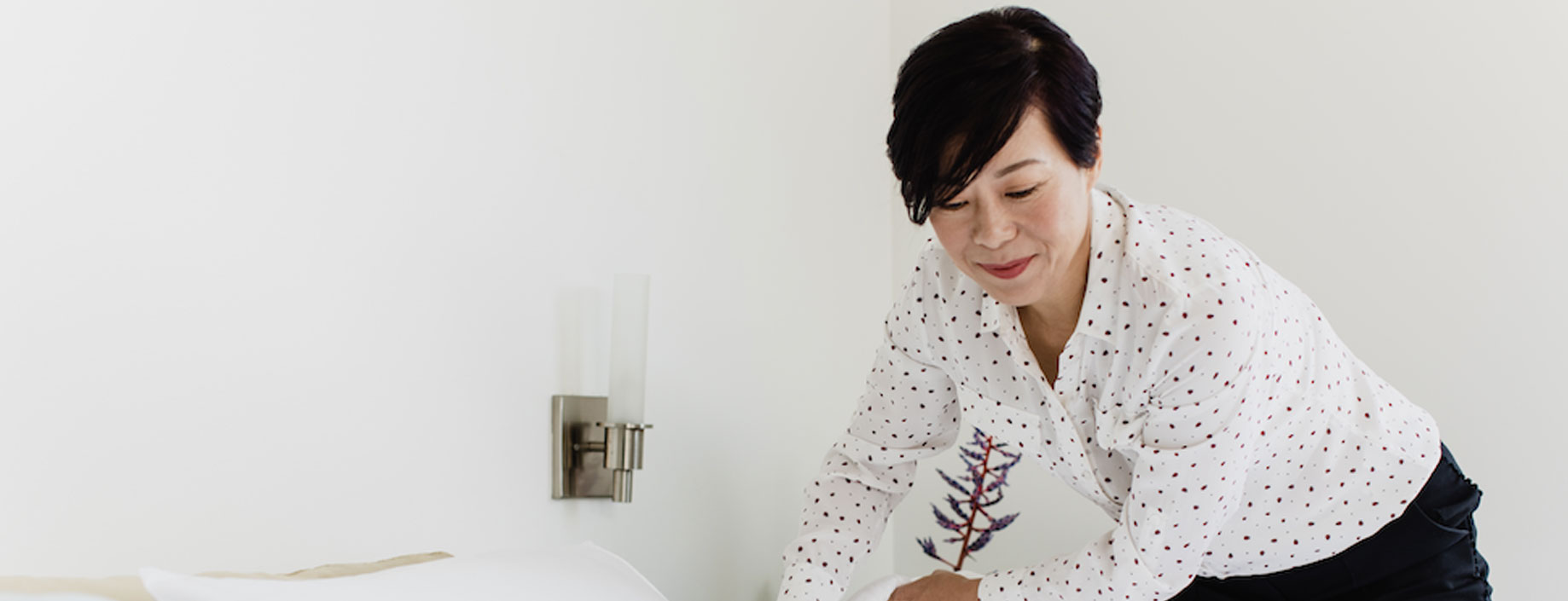
Phoebe yu
Passion for Sustainability
Tell us about ettitude’s products and the company’s mission.
We make sustainable and high-quality bedding, bath, and apparel using our proprietary clean bamboo fabric. Compared to cotton, it saves 99% of water and 38% of carbon emissions, so it’s really sustainable. It’s also really high-quality. The fabric is very soft and breathable, which customers love!
To convince more people to choose a sustainable product, I believe the product has to work first. And if it’s sustainable and at a great price point, why wouldn’t they choose it? To make a greater impact is, first and foremost, to have a better product.
Your website describes clean bamboo as “the fabric of our future.” What do you mean by that?
Cotton used to be called “the fabric of our lives.” But people have realized that it has negative impacts on the environment. Cotton production uses a lot of water, chemicals, and it’s labor intensive.
I think the time for cotton as “the fabric of our lives” has passed. Our clean bamboo has both performance and sustainability benefits. We think it’s the fabric for our future.
What impact are you aiming to create with your career and your company? What is the change that you wish to see in the world?
I’m really passionate about sustainability. That’s in the brand name: the “e” is for “eco attitude.” If everyone has that attitude collectively, we can solve the climate change crisis. I’m definitely still optimistic there.
I aim to use my platform not just to give people a better, more sustainable product, but also to educate and bring awareness to the many ways to address the climate problem. ettitude is also transparent – we give our consumers the impact data. We want to have a conversation with them to learn together.
How did you personally arrive at this impact mission?
When I moved from Shanghai to Melbourne, I started educating myself on the climate crisis. I volunteered at the Sustainable Living Foundation in Melbourne. As a volunteer, I really grew this passion, and I wanted to educate and move more people toward that direction.
As an eco-conscious consumer, I was looking at the market, and the products that I wanted – high-quality, sustainable, and well-priced – did not exist in the home sector.
So, I thought, “Oh, there’s an opportunity.” And I believed that there are tens of thousands of consumers out there who want the same kind of products that I want.
After I moved to the U.S., I kept growing the company, the platform, and the impact. All of our employees are very passionate about the same mission. So, they hold me accountable, which is really great. Our consumers do the same.
How has your leadership style or leadership approach evolved during your time as CEO?
In the early days, when you have a small team, you really need to have that can-do attitude, where you wear multiple hats and aren’t afraid to get your hands dirty trying new things. But as the team grows, the leadership style has to switch to finding the right talent and empowering them.
Otherwise, if I had kept trying to do all of the things, I would not have been able to do them all well. I needed to hire the right person for the right position for the right stage of the company. I provide the resources and the space and the support for them to do their jobs. That’s where I am at now.
What leadership lesson do you wish you had learned sooner?
Stay focused. Sometimes you might get distracted by new projects, new markets, new things. But unless you do one thing really well, you can’t move on to the next shiny new project. You and your team only have so much bandwidth.